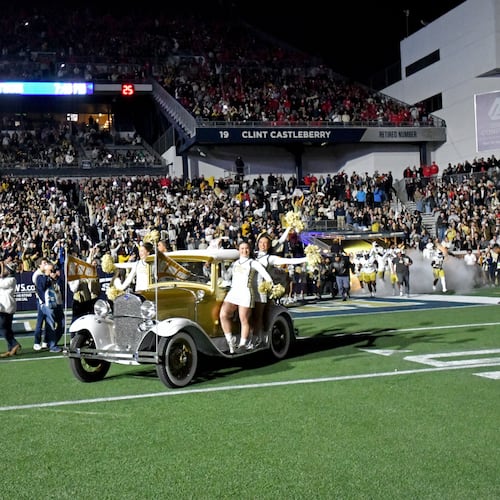The shooting by police of Jacob Blake in Kenosha, Wis., took its toll on Georgia Tech cornerback Jaytlin Askew, as did the deaths of George Floyd, Rayshard Brooks and other Black men killed by police officers before them.
They have haunted his thoughts, he said.
“When is it going to be over? When is the next shooting?” Askew said in a videoconference interview Thursday. “It’s like being in a nightmare that you can’t wake up from and just want to walk away from, but you can’t. Everything’s just happening. It’s new to some people, but it’s something that a lot of people – a lot of African American people – have been going through since we were kids.”
Askew, a senior, spoke with emotion about his experience as a Black man and his desire to use his voice as a power conference football player to share it with a larger audience.
“It really hurts you because I have a sister, and for me to see a woman killed on a street or something for doing nothing at all, it’s like I put her in that place,” Askew said. “And I’m like, that could be my little sister, that could be my mom or auntie. And then I have brothers, I have a father, I have cousins. And they could be any one of those guys that got killed, shot in the back, having a knee on their neck. They could be any one of them. Every time I see it, it really gets personal for me.”
Askew said he doesn’t care about “right or left party,” but sees police brutality as an issue of right and wrong.
“People like to say, ‘Oh, they had a history of (criminal behavior),’ but the police don’t have the right to decide who lives or dies,” Askew said. “That’s not your job. Your job is to protect and serve.”
Askew said that when he came to Tech as a freshman in 2017 from McEachern High, he saw himself as a football player without a purpose beyond that.
“But as I’ve been here, as I’ve been around great coaches, I’ve learned my purpose,” he said.
And part of that purpose, Askew said, is using his status to bring awareness to the issue of police brutality and racial injustice.
“It’s a hard thing to see,” he said. “I try not to get too emotional about it, but I know as soon as I step off this field, as soon as I walk out of the locker room, I’m just a Black man in America, and I’ve got to see all these wrongful injustices, all of them in my mind. I’ve got to think maybe I’m the next one, or maybe my friend Tre (Swilling) will be the next one, and I would hate for that to happen.”
On the day after the NBA, MLB, MLS and WNBA postponed games to protest and bring attention to the shooting of Blake and the broader issue of police brutality, Askew said that his team did not yet have a response planned, but expected that he and teammates would organize something.
“I hope people don’t think I’m just anti-football or anti-America,” Askew said. “I’m not that. I’m just right or wrong, and I know what’s right, and I promote what’s right. That’s the main thing for me.”
About the Author
Keep Reading
The Latest
Featured



